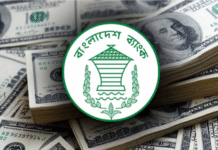Business Report
The political turmoil in the last quarter of 2013 inflicted a value added loss of about $1.4 billion, with 86 per cent estimates loss in services, 11 per cent in industry and 3 per cent in agriculture, the WB said in a report on Bangladesh.
It said the crisis eroded business and consumer confidence in general as the rate of return on investment perceived by domestic and foreign investors declined. Bangladesh and Afghanistan are two countries weighed down by political strains: they are the only exceptions to an optimistic picture painted by the World Bank for South Asia’s economic growth during the current fiscal.
Bangladesh is set to pay the bill of political turmoil: stagnating private investment is part of the bleak picture, according to the lending agency’s report released last week from Washington.
It is paired with lower consumption due to decreasing remittance flows. In the first nine months of the fiscal year, inward remittances fell 5.78 per cent year-on-year to $10.47 billion, data from Bangladesh Bank shows.
Inflation edged up 4 basis points to 7.48 per cent in March on the back of an increase in food price, particularly the staple rice. Stability in international commodity prices, weak domestic demand and some appreciation of the nominal exchange rate are combined with a restrained monetary policy to moderate inflation.
Economic activity recovered in the second half of the fiscal year, driven by resilient exports and domestic demand, following setbacks suffered in the first half due to political uncertainty and turmoil.
Foreign exchange reserves have increased to adequate levels, with a sustained large surplus in the overall balance of payments. The external current account surplus has remained comfortable to offset the decline in workers’ remittances.
Bangladesh has tremendous opportunity to grow. It has relatively high performance in terms of economic growth compared to other countries in the region. But getting out of low private investment should be a priority to spur further growth.
The region’s largest economy, India, would see growth rise to 5.7 per cent this fiscal year from 4.8 per cent last fiscal year with activity receiving a boost from a more competitive exchange rate and many large investment projects going ahead, the WB forecasts.
Pakistan’s economic growth could increase to 4 per cent this fiscal year from 3.6 per cent in fiscal 2012-13 as its economy benefited from a reduction in electricity blackouts, resilient remittance flows from Pakistani workers abroad, rebounding manufacturing exports and a more buoyant services sector.
Nepal was recovering from a difficult year affected by setbacks in the agricultural sector and with its government budget. Helped by strong remittance flows to boost consumption and services sector, the economy Nepal’s economy is set to grow by 4.5 per cent in fiscal 2013-14 after 3.6 per cent in fiscal 2012-13.
Sri Lanka would continue to grow at 7.3 per cent this year after the country’s recent conflict. The economy in Afghanistan will be weighed down by the persistent uncertainty caused by the withdrawal this year of international forces and the subsequent reduction in foreign aid.
WB lead economist at Bangladesh Mission Dr Zahid Hussain said investment is still going through uncertainty in Bangladesh after the political unrest in the first half of the current fiscal.
“The current political stability needs to be settled to lure investment. He also said Bangladesh’s exports went up — despite image crisis because of recent disasters in the garment sector — due to the country’s delivery capacity — a level can’t be seen in its close competitors.
“Bangladesh will have to resolve its image crisis in the garment sector as fast as possible, as its competitors are seriously working to expand their capacity level.”
In its report, the WB also said the financial sector in South Asia is in stress. “A rise in default risk across the board due to losses inflicted by a prolonged disruption in production and trade has worsened the state of the banking sector.”
“The state-owned banks were already negatively impacted by the earlier financial scams. The growing nonperforming loans of private commercial banks are also a matter of concern.”
Source: Weekly Holiday









